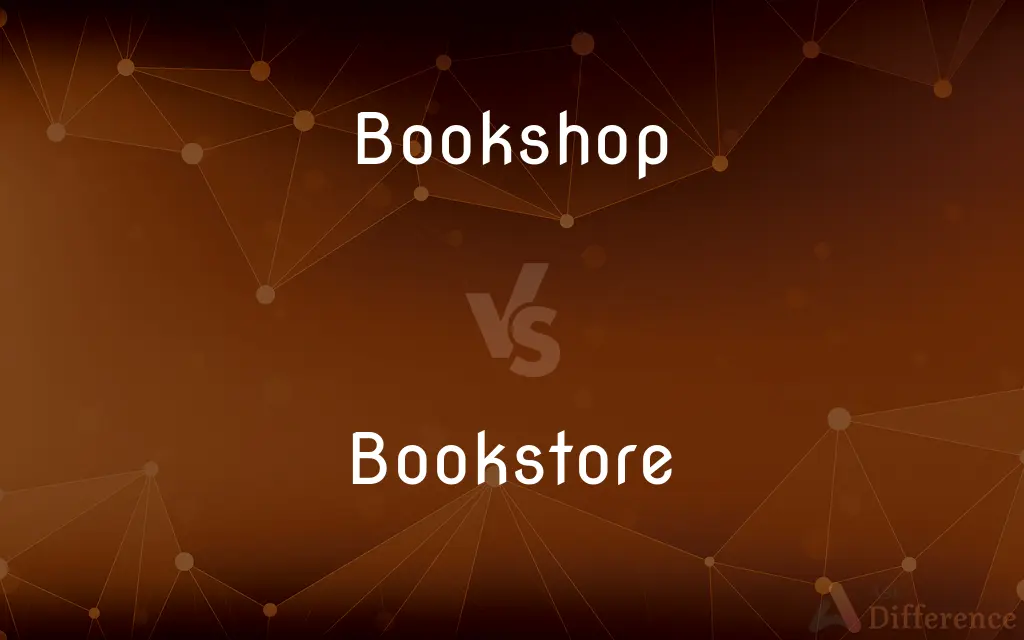Bookshop vs. Bookstore — What's the Difference?
Edited by Tayyaba Rehman — By Maham Liaqat — Updated on April 3, 2024
A bookshop typically refers to a smaller, often independent retail outlet selling books, with a quaint or specialized focus, while a bookstore might imply a larger, possibly chain-operated store with a wide range of books and related merchandise.

Difference Between Bookshop and Bookstore
Table of Contents
ADVERTISEMENT
Key Differences
Bookshops are often perceived as smaller, independent entities that may specialize in certain genres or offer a curated selection of books. These establishments often emphasize a personal touch, including recommendations from knowledgeable staff and a cozy atmosphere. Bookstores, in contrast, are generally larger and may be part of a chain, offering a wide array of books across various genres, as well as additional items like café services, stationery, and electronics in some cases.
The term bookshop can evoke an image of a more traditional or boutique setting, where browsing is encouraged, and the space itself contributes to the experience of book buying. Customers might frequent bookshops for their unique charm, community feel, and specialized stock. Conversely, bookstores are frequented for their extensive inventory, including the latest bestsellers, educational materials, and a broad selection of magazines and newspapers.
In terms of business model, bookshops may rely more on community engagement, hosting events like book readings, signings, and discussion groups to build a loyal customer base. Bookstores, especially those that are part of larger chains, might have the resources to offer discounts, loyalty programs, and a more extensive online presence, catering to a wider audience with competitive pricing and accessibility.
Culturally, bookshops can play a significant role in promoting local authors and literary culture, often serving as a hub for literary events and fostering a sense of community among readers. Bookstores, with their broader scope, have the advantage of drawing in a diverse clientele, providing access to a wide range of perspectives and voices in literature, and potentially offering spaces like cafes and lounges for customers to gather and discuss their latest reads.
While the distinction between bookshop and bookstore might not be strictly adhered to in all contexts, with many using the terms interchangeably, the nuanced differences reflect varying consumer experiences, business strategies, and cultural roles within the community of readers and writers.
ADVERTISEMENT
Comparison Chart
Size
Typically smaller, possibly with a single location.
Usually larger, can be part of a chain.
Focus
May specialize in certain genres or themes.
Offers a wide range of books and possibly other merchandise.
Atmosphere
Quaint, personal, encourages browsing.
Modern, efficient, designed for volume sales.
Community Role
Hosts events, fosters local literary culture.
Offers broader events, may have spaces for socializing.
Inventory
Curated selection, unique finds.
Extensive inventory, including bestsellers and media.
Compare with Definitions
Bookshop
A smaller, often independent retail outlet focusing on selling books.
The local bookshop specializes in rare and out-of-print books.
Bookstore
A large retail establishment selling books and often other items, like stationery or café services.
The downtown bookstore is part of a national chain and offers a wide selection of titles.
Bookshop
Known for their quaint charm and personalized service.
She loved the cozy atmosphere of the corner bookshop, with its knowledgeable staff.
Bookstore
Offers a broad range of genres, including magazines and educational materials.
You can find almost any book you're looking for at the large bookstore near the mall.
Bookshop
Frequently hosts local author readings and book clubs.
The bookshop downtown is a favorite spot for monthly book club meetings.
Bookstore
May include a café, reading areas, and electronic merchandise.
The bookstore has a café where customers can read the books they are considering buying.
Bookshop
May focus on specific genres or interests.
That bookshop is well-known for its extensive collection of science fiction.
Bookstore
Hosts book signings and readings with both local and national authors.
A well-known author is doing a signing at the bookstore this weekend.
Bookshop
Relies on community support and engagement.
The bookshop thrives on its reputation as a community gathering place for literature lovers.
Bookstore
Often provides extensive online shopping options.
Their bookstore website offers an online shopping option with a wide range of ebooks as well.
Bookshop
A shop where books are sold.
Bookstore
A store where books are sold.
Bookshop
A bookstore.
Bookstore
A store where books are bought and sold.
Bookshop
A shop that sells books.
Bookstore
A store where books are kept for sale; - called in England a bookseller's shop.
Bookshop
A bookseller's shop.
Bookstore
A shop where books are sold
Bookshop
A shop where books are sold
Common Curiosities
Are bookshops becoming less common?
In some areas, yes, but many thrive by catering to niche markets and fostering community engagement.
Can bookshops offer the same range as bookstores?
While bookshops might offer a curated selection, large bookstores typically have a broader range.
Do bookstores always belong to chains?
Not always, but the term bookstore is often used for larger or chain-operated establishments.
Can you find rare books in bookstores?
It's possible, but bookshops, especially those that specialize, may be more likely to stock rare or unique titles.
Is the atmosphere different in bookshops and bookstores?
Typically, yes; bookshops often have a more intimate, personal feel, while bookstores may focus on efficiency and selection.
Do bookstores replace bookshops?
In some markets, yes, but each has its own niche and customer base.
How do bookshops compete with bookstores?
By offering specialized knowledge, personalized service, and community engagement.
Is there a difference between a bookshop and a bookstore?
Yes, the terms often imply differences in size, focus, and atmosphere, though they can be used interchangeably.
Are bookstores more expensive than bookshops?
Pricing can vary, but large bookstores might offer discounts due to their scale, whereas bookshops might have unique finds that justify higher prices.
Do both bookshops and bookstores host events?
Yes, both can host events, though the nature and scale of these events might differ.
Which is better for local authors, bookshops or bookstores?
Both can be supportive, but local authors might find more personalized opportunities in bookshops.
How do online sales impact bookshops and bookstores?
Both face challenges from online retailers, but many have adapted by offering unique in-store experiences or online sales themselves.
Can both bookshops and bookstores be found in the same area?
Yes, they can coexist, each catering to different aspects of the book-buying market.
Can you find non-book items in bookshops?
Yes, many bookshops also sell stationery, gifts, and other related items, though the range may be more curated.
What role do bookshops play in the community?
They often serve as cultural hubs, supporting local authors and literary events.
Share Your Discovery

Previous Comparison
Folly vs. Foolishness
Next Comparison
Maker vs. CreatorAuthor Spotlight
Written by
Maham LiaqatEdited by
Tayyaba RehmanTayyaba Rehman is a distinguished writer, currently serving as a primary contributor to askdifference.com. As a researcher in semantics and etymology, Tayyaba's passion for the complexity of languages and their distinctions has found a perfect home on the platform. Tayyaba delves into the intricacies of language, distinguishing between commonly confused words and phrases, thereby providing clarity for readers worldwide.














































